

AASL 2013 Unconference Conversations Grid. 10 Ways Librarians Can be a Marketing Genius Like Lady Gaga. Tomlinson_FindingInspiration.pdf. CastroChandlerWilcox_Hidden.pdf. LeebawPartloTompkins_HowIsThis.pdf. Connaway_Google.pdf. GulickOBrienWhite_Librarians.pdf. Calkins_Mixed.pdf. SzurmakThuna_TellMe.pdf. 10 things teachers should unlearn. 10 things parents should unlearn. “We need to educate the parents.”
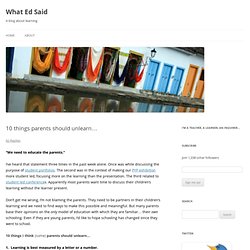
I’ve heard that statement three times in the past week alone. Once was while discussing the purpose of student portfolios. The second was in the context of making our PYP exhibition more student led, focusing more on the learning than the presentation. The third related to student led conferences. Apparently most parents want time to discuss their children’s learning without the learner present. Stepping Up Our Game: School Libraries and Self Assessment. Sometimes I wonder why I still subscribe to so many professional journals.
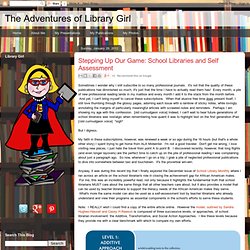
It's not that the quality of these publications has diminished so much, it's just that the time I have to actually read them has! Every month, a pile of new professional reading lands in my mailbox and every month I add it to the stack from the month before. And yet, I can't bring myself to cancel these subscriptions. When that elusive free time does present itself, I still love thumbing through the glossy pages, adorning each issue with a rainbow of sticky notes, while lovingly annotating the margins of particularly meaningful articles with scrawled notes and reminders. Perhaps I am showing my age with this confession.
But I digress. My faith in these subscriptions, however, was renewed a week or so ago during the 16 hours (but that's a whole other story) I spent trying to get home from ALA Midwinter. Note: I REALLY wish I could find a copy of the entire article online. Again, let me be frank. Are Librarians Still Important? Three years ago, an elite private school in Massachusetts shocked the education world by banishing its 20,000-volume library collection in exchange for digital resources, Amazon Kindles, and flat-screen televisions.
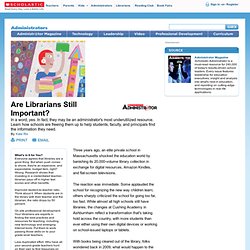
The reaction was immediate. Some applauded the school for recognizing the new way children learn; others sharply criticized the school for going too far, too fast. While almost all high schools still have libraries, the changes at Cushing Academy in Ashburnham reflect a transformation that's taking hold across the country, with more students than ever either using their own digital devices or working on school-issued laptops or tablets. With books being cleared out of the library, folks wondered back in 2009, what would happen to the person in charge of the room? How Does Your Boss See You?: Proof That Principals Value Librarians. Illustration by David Flaherty Librarians’ Top 10 Tasks How principals see them Help students to access information and books.Help faculty to access information and books.Share technology expertise with students and teachers.Select “appropriate” materials.Model love for reading.Collaborate with teachers.Provide equipment (preferably “fast” equipment) and technology.Provide leadership with technology.Teach research skills, teach about books, and teach about databases.Provide an inviting environment.
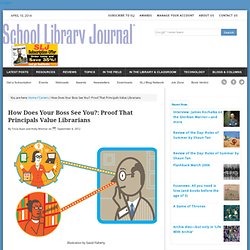
Who can we trust? The importance of teaching our students to interpret the news. Screenshot from the linked article on Opening up my favourite news app, Zite, the other day, one of the top stories was this eye opener from Australia’s national broadcaster’s – the ABC – news website.
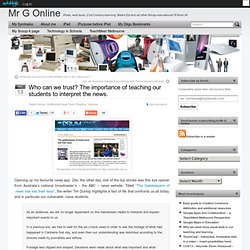
Titled “The Gatekeepers of news has lost their keys”, the writer Tim Dunlop highlights a fact of life that confronts us all today, and in particular our vulnerable, naive students. As an audience, we are no longer dependent on the mainstream media to interpret and explain important events to us.In a previous era, we had to wait for the six o’clock news in order to see the footage of what had happened in Canberra that day, and even then our understanding was restricted according to the choices made by journalists and editors.Footage was clipped and shaped.
MediaLit Moments. Friday, 19 May 2017 11:06 Beth Thornton In the “olden days,” people primarily relied upon newspapers for their news, and the papers were clearly labeled by section -- “News” “Features” “Opinion.”
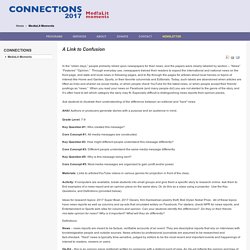
Through everyday use, newspapers trained their readers to expect the international and national news on the front page, and state and local news in following pages, and to flip through the pages for articles about local heroes or topics of interest like Home and Garden, Sports, or their favorite columnists and Editorials. Today, such labels are abandoned when articles are lifted as links and shared via social media, or when people check YouTube for the latest news, or when people accept their friends’ postings as “news.”
When you read your news on Facebook (and many people do!) You are not alerted to the genre of the story, and it’s often hard to tell which category the story may fit. Ask students to illustrate their understanding of the difference between an editorial and “hard” news. VanHoeckHoffmann_FromAudience.pdf. GremmelsCampbell_JustIn.pdf. LeibigerAldrich_Mother.pdf. Computational Thinking. Invitation to a Dialogue - An Excess of Testing.